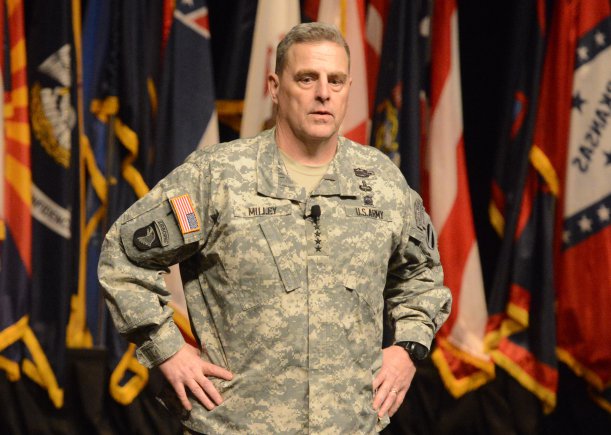By SYDNEY J. FREEDBERG JR
 Trump certainly fell in and out of love fast with the last outspoken warrior-intellectual he hired, short-lived National Security Advisor H.R. McMaster.
Trump certainly fell in and out of love fast with the last outspoken warrior-intellectual he hired, short-lived National Security Advisor H.R. McMaster.
WASHINGTON: President Trump has one thing in common with his pick for Joint Chiefs chairman, the current Army Chief of Staff, Gen. Mark Milley: When they speak, they get your attention.
Milley on bypassing Pentagon weapons-buying bureaucracy? “Cut us loose and see what happens. If we fail, fire us.”
Milley on national security threats? “Russia is the only country on earth that retains a nuclear capability to destroy the United States.”
Milley on the next big war? “On the future battlefield, if you stay in one place longer than two or three hours, you will be dead.”
Milley on how to wage that war and win? “A perfect harmony of intense violence.”
Milley on the cost of war? “All of us who led soldiers in combat … we all know the ghosts of our battles past. For me that number is 242.”
Milley on the Charlottesville protest killing just after Trump said there was blame on both sides?
While previous Army chiefs, all admirable men, tended to be quiet, bland, or outright inarticulate, General Milley erupted into the job in 2015 with a gift for rhetoric and tremendous energy for reform. In the three years since, he won over National Guard activists who’d feuded bitterly with his predecessor, created new advisor brigadesand experimental units, launched the biggest reorganization of the Army in 40 years, and set clear R&D priorities — Thousand-mile missiles! Robotic tanks! Super-fast helicopters! Bigger bullets! — that Trump’s political appointees then embraced with big budget boosts.
Oh, and West Point finally won the Army-Navy game, twice, after 14 years of losing. We’ll see how the game plays out tomorrow, when Trump is supposed to announce Milley’s nomination for JCS chairman on the sidelines.
That sort of showmanship would be distinctly uncomfortable for most prior Army chiefs or for the current, resolutely low-key chairman of the Joint Chiefs, Marine Corps Gen. Joseph Dunford. But Milley, despite a reputation as a “soldier’s soldier,” a gruff old grunt with more time in war zones than in Washington, has both dramatic flair and the intellectual firepower to back it up. He’s done more to change the Army than any single soldier in decades.
But there’s the catch. Milley actually changes things. He’s outspoken, even blunt, though I suspect there’s much more calculation behind his language than he lets on. And he gets attention. All these qualities that endear him to Trump today could set him up for dramatic conflict later — over Trump’s proposed defense cuts, for example, or Milley’s relentless push to counter Russia.
Trump certainly fell in and out of love fast with the last outspoken warrior-intellectual he hired, short-lived National Security Advisor H.R. McMaster. Milley could be headed for a similar dramatic breakup. Or he could be ground down slowly like Marine Gen. John Kelly, who’s counting down his last days as chief of staff. Or he could spend years fighting rumors of conflict with the White House and his imminent resignation, punctuated by the occasional public revolt over the budget, like Defense Secretary Jim Mattis. Indeed, of the four much-heralded generals Trump picked for high positions early in his term, he seems to speak most highly of the one who never got into office, scandal-stricken Mike Flynn.
Even after 20 years covering the Army, I have no idea how this will go. But I can promise you it will be worth watching.

No comments:
Post a Comment